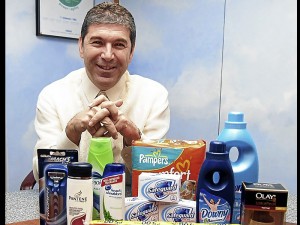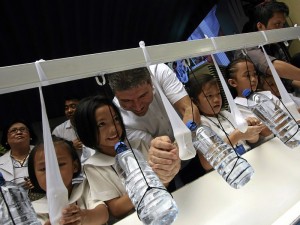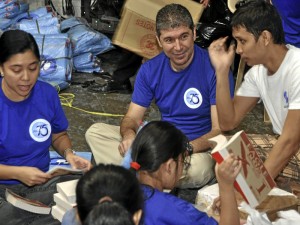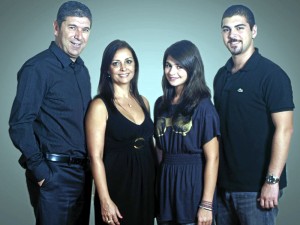By: Abigail L. Ho
Philippine Daily Inquirer
11:40 pm | Saturday, December 10th, 2011
 |
SIDDIK Tetik poses with P&G
products manufactured and sold
in the Philippines. |
In the fast moving consumer goods industry, pressure is a daily fare
and stress in nothing out of the ordinary.
Different brands fight over
the Filipino consumers’ scarce cash on a daily basis and market
leadership can change hands in the blink of an eye if a brand gets too
complacent.
Despite its strong 76-year presence in the country, P&G
Philippines, one of the world’s biggest consumer goods companies,
experiences the same daily stress every day. But looking at president
and general manager Siddik Tetik, one will not be able to tell that that
is the case.
With his calm demeanor and almost permanent smile, one would think he
is a vacationing expat instead of the man at the helm of one of the
country’s most successful companies.
His secret: Calmness at all times.
“
I’m balanced and calm. Even in tough situations, I keep my calmness
and never show panic to my team. It allows me to think (in a healthy
manner),” he tells SundayBiz. “
My calmness—people appreciate this. Even
when I face big issues, I don’t react severely.
Sometimes people react
without thinking, and that causes damage. If you’re a smart person, you
will stop and think about the consequences of your actions before
reacting and making decisions.”
When he finds himself in particularly nasty situations, he relates
that he usually writes his thoughts down, instead of directing venomous
comments at a particular person.
He holds back unbecoming retorts and
contents himself with blowing off steam by writing e-mails that he never
sends.
 |
THE
PRESIDENT and general manager
of P&G Philippines teaches young
schoolchildren the proper way
to wash hands with soap for
Global
Handwashing Day. |
After typing away on his computer and rereading what he has written,
he says he has already calmed down enough to face the people that he has
to face and to make whatever decision has to be made.
This is one trick that he says he shares with his people, knowing how stressful the environment P&G is operating in.
Work-life balance
Striking a healthy balance between work and personal life is another
thing that he strives to achieve, and wants to impart to his people as
well. For someone who is leading a consumer goods giant operating in a
fiercely competitive environment, Siddik can hardly be described as a
workaholic.
He usually wakes up at between 6:30 and 7 a.m. and uses the first few
hours of his day to just relax and prepare his mind for the work day.
“I try not to think too much. I have my breakfast, I take my coffee
or tea, and have some time for myself. There should be no discussion of
major decisions before 10 a.m. People in the office know this, and even
my wife knows this. Unless something is absolutely crucial, it has to
wait after 10 a.m.,” he relates.
By 6:30 p.m., he is usually out of the office and either out with friends or at home with his family.
 |
TETIK volunteers with other P&G
employees in packing school supplies
for the company’s Handog Edukasyon
program. |
He is also not one for making plans as far as his personal time is
concerned.
He prefers to be spontaneous and do things when he feels like
doing them. The simplicity of life in the Philippines, he says, suits
his calm personality well.
“
I don’t like programming my personal life. I like to be spontaneous.
My wife likes to program our lives, like when we should take vacations,
but I prefer surprises,” he says.
From rocks to razor blades
Even his being in the consumer goods industry was totally unplanned. A
geology major and a son of a military man who had no idea whatsoever
about business,
Siddik literally had to learn his way to the top,
starting from a job in sales at the time when Western brands were just
making their way into Turkey.
He relates that after rendering mandatory military service in
Northern Cyprus, he met some entrepreneurs in Turkey who offered him a
job.
Despite his lack of experience, he took the job and absorbed
everything like a sponge.
Learning became a daily exercise for him back then—something that he
says is still true for him today. For his work in sales, it also helped
that he had a good command of the English language and he had a great
personality fit for the job.
 |
SIDDIK Tetik, wife Neslihan,
daughter Bengi, and son Birkin |
“
But I never knew that. It’s really difficult to decide exactly what
you would do in your work life while you’re still in university,” he
says. “
During my early days, I started working based on the trust of
people and whatever skills I had that I wasn’t even aware of. I then
built my capabilities on observing—I observed business models in Europe
and East Asia and learned from our visitors. I did a lot of
self-learning.”
There was even a point when he felt like giving up, but decided to
push on anyway. The decision to stay could very well be one of the best
ones he had ever made. After spending several years holding senior
positions at Gillette, he became a key P&G executive when the latter
acquired the former.
At P&G, his propensity to learn was put to the test once again,
as it was a new culture that he had to familiarize himself and adapt
with. As with all other aspects of his life, he did that a step at a
time.
Even now, as head of one of P&G’s most important markets in Asia,
he says he continues to learn, with his personal and career goals fixed
on the short term rather than the long term.
“
Life is interesting. If you plan too far ahead, it will be limiting.
Have short goals rather than long ones. Build your treasures as you go.
Being a CEO is a good dream to have, but you have to have shorter goals
so you can better enjoy life and be happy,” he relates.
“
Set two or three-year challenges. When you overcome those
challenges, that will give you much needed confidence to move to another
level and set new goals. Always assess yourself and extend your vision
of your life based on that,” he further says.
The passion to grow and win should always be there, he says, as this
fuels a person’s success. He also swears by his mantra of
never ceasing
to learn. This, on top of his calm and rational thinking, after all, is
what has propelled him to where he is today.
http://bit.ly/uKl7J6



